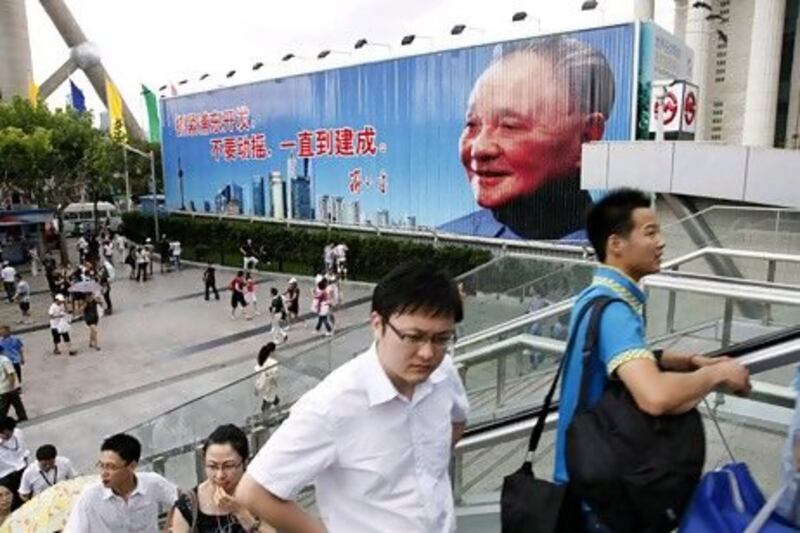BEIJING // Deng Xiaoping shaped modern China, leading with market reforms that turned the country into an economic powerhouse.
Yet the 15th anniversary of the former leader's death is being marked by just a photographic exhibition and a few speeches in Guang'an, his birthplace in south-west China. That the events are low-key is unsurprising since Deng, despite his influence, never fostered the kind personality cult that surrounded his predecessor, Mao Zedong, statues of whom can still be found in many Chinese cities.
While Mao is often remembered for his failed industrialisation programme and the fanaticism unleashed by the Cultural Revolution, Deng's towering legacy can be found in the big-city skyscrapers and the factories of the south and east coasts.
In the late 1970s, after pushing aside Mao's chosen successor and becoming China's paramount leader even while still a vice premier, Deng launched special economic zones that ultimately resulted in China's becoming the world's biggest manufacturer. It displaced Japan as the second-largest economy in 2010.
Rejecting communist dogma, he is said to have proclaimed: "Poverty is not socialism. To get rich is glorious." In another memorable quote he declared some people must be allowed to "get rich first".
His reforms began in Shenzhen near Hong Kong, a modest town when it was chosen to be China's first special economic zone in 1979. Now it is a vast mass of high-rises with a near-mythical status as the birthplace of the country's economic miracle.
Yet it was no easy task for Deng to achieve his ambitions, as his reformist tendencies saw him fall from favour on two occasions during Mao's time when the leader removed him from his positions of power.
Deng's reforms faced fierce opposition and stalled after the 1989 Tiananmen Square crackdown when conservatives reasserted themselves.
It took Deng's southern tour, a swing through the key developing economic centre, to revive the initiative and lay the groundwork for the frenzied economic growth under Deng's successors Jiang Zemin and Hu Jintao. Tuesday marks 20 years since the southern tour ended, and this weekend's events have also been marking this anniversary.
"Deng Xiaoping was the unbalanced reformer because he totally concentrated development along the coast. He created an incredibly efficient, specialised industry base because of the spatial location. Unbalanced growth was the key to China's success," said Yukon Huang, a senior associate with the Asia programme of the Carnegie Endowment for International Peace and a former World Bank director for China.
The disparities in income that resulted from allowing some to "get rich first" remain acute and are seen as a potential source of disenchantment that could lead to anger against the government.
Some call for another Deng-like strongman to tackle the vested interests in the party and key state-owned companies that have benefited from his reforms but who resist the creation of a true market economy with proper institutional controls and rule of law. The current collective leadership is said to be unwilling to take on these vested interests.
"The urge for ongoing reform is running way ahead of action. We need the opposite. Like Deng on his tour, an exceptional leader must take a stand with a vision that's ahead of the times, not behind, and lead China forward," Caixin Online, a Beijing-based media company said in an editorial earlier this month.
With China's system of collective leadership now firmly entrenched, the prospects of there being another leader with Deng's power seem remote. In this context, discontent fuelled by the current situation leads to nostalgia about Deng's predecessor.
"During the Mao era, even if everybody was poor, everybody was equally poor," said Ting Wai, a political analyst at Hong Kong Baptist University.
"Today we have very large social inequality. Many people say this was the fault of Deng Xiaoping. Chinese society is composed of a minority of rich people and those people appointed to political power and the sons and daughters of people with political power. It's a major source of instability."
Yet for all the potential faultlines Deng's reforms led to, he brought prosperity and for this he remains popular. The 1989 Tiananmen Square crackdown did much to harm the image of the then premier, Li Peng, but has been less associated with Deng. In any case, many young Chinese know little or nothing about that chapter of history.
"If there was no Deng Xiaoping and the past 30 years of economic revolution, we wouldn't have a better life like this," said Li Qi, 26, who works for a film-production company.






